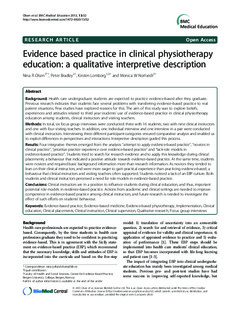Evidence based practice in clinical physiotherapy education: a qualitative interpretive description
Abstract
Background Health care undergraduate students are expected to practice evidence-based after they graduate. Previous research indicates that students face several problems with transferring evidence-based practice to real patient situations. Few studies have explored reasons for this. The aim of this study was to explore beliefs, experiences and attitudes related to third year students’ use of evidence-based practice in clinical physiotherapy education among students, clinical instructors and visiting teachers. Methods In total, six focus group interviews were conducted: three with 16 students, two with nine clinical instructors and one with four visiting teachers. In addition, one individual interview and one interview in a pair were conducted with clinical instructors. Interviewing three different participant-categories ensured comparative analysis and enabled us to exploit differences in perspectives and interactions. Interpretive description guided this process. Results Four integrative themes emerged from the analysis: “attempt to apply evidence-based practice”, “novices in clinical practice”, “prioritize practice experience over evidence-based practice” and “lack role models in evidence-based practice”. Students tried to search for research evidence and to apply this knowledge during clinical placements; a behaviour that indicated a positive attitude towards evidence-based practice. At the same time, students were novices and required basic background information more than research information. As novices they tended to lean on their clinical instructors, and were more eager to gain practical experience than practicing evidence-based; a behaviour that clinical instructors and visiting teachers often supported. Students noticed a lack of an EBP culture. Both students and clinical instructors perceived a need for role models in evidence-based practice. Conclusions Clinical instructors are in a position to influence students during clinical education, and thus, important potential role models in evidence-based practice. Actions from academic and clinical settings are needed to improve competence in evidence-based practice among clinical instructors, and future research is needed to investigate the effect of such efforts on students’ behaviour. Keywords: Evidence-based practice; Evidence-based medicine; Evidence-based physiotherapy; Implementation; Clinical education; Clinical placements; Clinical instruction; Clinical supervision; Qualitative research; Focus group interviews

